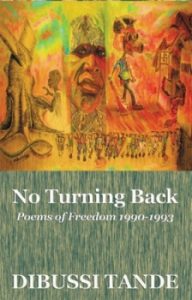Collection of Poems Entitled “No Turning Back” (2007)
Reviewed by Canute Tangwa
Dibussi Tande. No Turning Back. Langaa Publishers, 2007
 Reading through Dibussi Tande’s collection of poems NO TURNING BACK (2007), I could not but recall Wole Soyinka’s one point five billion naira question: “How did creativity survive under such arbitrary exercise of power? How did Art survive in a climate of fear?”(2004 Reith Lecture).
Reading through Dibussi Tande’s collection of poems NO TURNING BACK (2007), I could not but recall Wole Soyinka’s one point five billion naira question: “How did creativity survive under such arbitrary exercise of power? How did Art survive in a climate of fear?”(2004 Reith Lecture).
Dibussi Tande wrote most of his poems in an atmosphere (the turbulent and fiery 1990s; clamor for political change in Cameroon and the coming to the fore of the so called Anglophone Cameroon self-determination) of fear, uncertainty and expectation.
At the time something apparently of import but that went without much notice happened; the manhandling and belittling of the much heralded and celebrated writer Mongo Beti in the streets of Yaounde by policemen as the prince was moving out of town. Thus, the line between ART as vision cum commitment and ART as emotion and spectacle was drawn.
NO TURNING BACK encapsulates the Christian eschatological trinity of Vision, Tribulation and Hope; all these subsumed into the quest for freedom and political space that the poet skilfully handles as if to the manner born.
Dibussi makes poetry look refreshingly simple but vision-packed. His language departs from the hermetic forms associated with mentors like Bate Besong and precursors such as Christopher Okigbo. Through Dibussi, the poet has elected domicile at the marketplace. He is no longer a wizened seer; remote from society. Dibussi is a skilful language resource manager: short powerful lines and a constant/unbroken rhyming pattern.
Though visionary poetry is serious business one cannot help but move in time and beat with the musical undertones, though monotonous, of Dibussi’s poignant, podgy and at times sorrowful lines. The lines in Amand’la conjure sweet memories of Miles Davis’ rendition of this ‘South African nationalist rallying slogan’.
No keen reader can pin Dibussi on any particular poetic school of thought. He is neither a classicist, an abstract expressionist, modernist nor postmodernist. However, he has a bias for the traditional; witness Dibussi’s concern for aesthetics in all his poems.
It cannot be gainsaid that the poet has a wide intellectual baggage. He taps from or draws inspiration from several sources. For example the poem, I Know Why the Frog Croaks So Loud, immediately brings to mine Maya Angelou’s I Know Why The Caged Bird Sings.
Dibussi draws from home-grown as well as international experiences. He moves effortlessly from the fiery 1990s in Cameroon characterized by the fear of the midnight knock from gendarmes, street battles with the forces of law and (dis)order, fight for political liberty, Anglophone Cameroon reawakening to apartheid South Africa, the killing fields of Serbia, the butchery and rape of the Congo and Liberia, the hollowness of Francophonie as well as the plight of the African American.
In one sweep, Dibussi takes us round the world of tribulations. Of tribulations, he reminisces on a late lamented mutual friend, Etekele. But this is symptomatic because it symbolises a lost generation!
However, he sees hope (though minimalist) in the horizon because “The mighty Fako mountain/ And the crumbling Bismark Fountain/Shall spit out freedom’s fiery venom/That will end this shameful serfdom;/ Our nation shall be born again/ And our freedoms forever regained”.
“No Turning Back” can be purchased from major online bookstores such as www.amazon.com. It will soon be available in bookstores in Cameroon.
